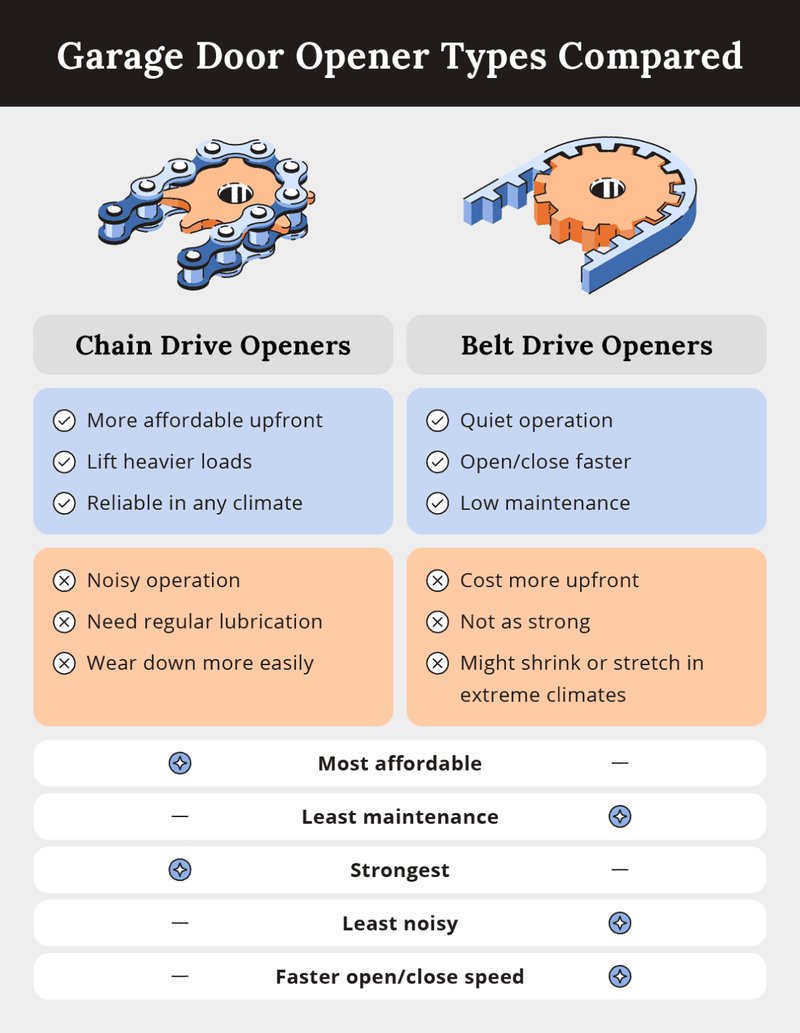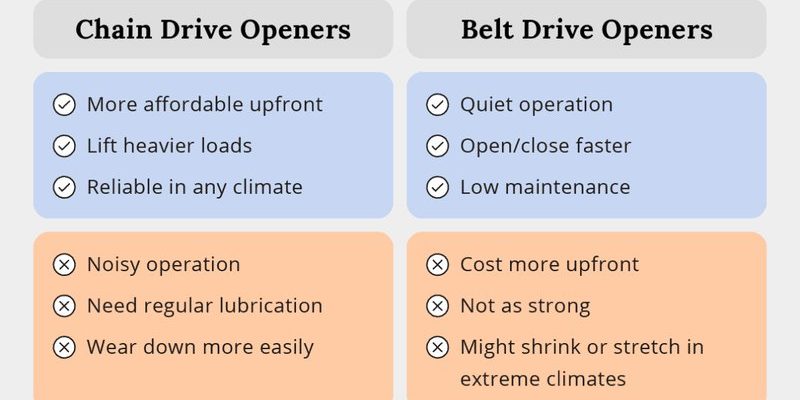
This article will break down the different types of garage door openers and how their mechanisms affect opening and closing speeds. Knowing what to expect can help you pick the right opener for your needs whether you’re upgrading or just curious about garage door technology.
Understanding Garage Door Opener Drive Types
Before diving into speed comparisons, let’s unpack what a garage door drive type is. The drive mechanism is the heart of your garage door opener, determining how the door moves up and down. The three main types are belt, chain, and screw drive. Each has its own characteristics, affecting speed, noise, and maintenance needs.
– Belt Drive: This uses a rubber belt to lift the door. It’s known for being quiet and smooth, making it a favorite for homes with attached garages.
– Chain Drive: This mechanism uses a chain (like a bike) to pull the door up. It’s robust and often the most affordable option, but it can be noisy.
– Screw Drive: A screw drive uses a threaded steel rod to lift the door. It’s usually faster than chain and belt drives but is more sensitive to temperature variations.
Now that we’ve established the basics, let’s take a closer look at how speed comes into play.
Comparing Speed: Belt vs. Chain vs. Screw Drive
When it comes to speed, each drive type offers different performance levels. The true test lies in their opening and closing times, which can affect convenience in daily life. Here’s how they stack up:
| Drive Type | Speed (in seconds) to Open | Speed (in seconds) to Close |
|————-|—————————–|——————————|
| Belt Drive | 10-15 seconds | 10-15 seconds |
| Chain Drive | 12-20 seconds | 12-20 seconds |
| Screw Drive | 8-12 seconds | 8-12 seconds |
Honestly, screw drives have the edge in speed, opening and closing doors faster than their belt and chain counterparts. You might be wondering why you’d want to focus on speed—especially since noise and reliability can also be factors.
Belt Drive Opener: Speed and Smoothness
Belt drives are the quiet champions of the bunch, but how do they fare in speed? Typically, a belt-driven opener can open a standard garage door in 10 to 15 seconds. This speed is complemented by its smooth operation, which minimizes jarring motions.
Here’s the thing: if you’re in a hurry to get inside, that smooth, quick rise means less waiting time outside your house. The downside? If you live in an area where temperatures drop significantly, like below freezing, the rubber belt can be sluggish. Regular maintenance is crucial, which can slightly affect the speed if the belt isn’t tensioned correctly.
Chain Drive Opener: Power Meets Noise
Chain drive openers operate by pulling the door up on a chain. While they’re the most rugged and reliable option, they can be quite loud. In terms of speed, you can expect a chain drive to open a garage door in 12 to 20 seconds.
If you have a detached garage, noise might not be an issue. However, if your garage is right beneath your bedroom, that chain growl during midnight arrivals might wake you up! If you’re thinking about durability, chain drives often deliver a long lifespan, but you’ll need to regularly lubricate the chain for peak performance.
Screw Drive Opener: The Fastest Option
A screw drive opener is often thought to be the speedster of the trio. Typically, these openers can lift a garage door in about 8 to 12 seconds. This drive type is simple and straightforward with fewer moving parts, which means less maintenance.
Here’s a fun tidbit: the screw mechanism allows the door to rise straight up, making it feel like it’s flying. However, if you live in an area with temperature extremes, you may have to adjust the speed or lubrication, as the mechanism can get sluggish when it’s too cold or hot.
Speed vs. Noise: Finding the Right Balance
While speed is an essential factor, it’s important to balance it with noise levels, especially when you’re pulling into the driveway late at night.
If quiet operation is paramount, the belt drive is your best friend, despite being a tad slower than screw drives. On the flip side, if speed is what you need—like hurrying in or out during rain or snow—screw drives win but come with possible noise issues.
– Belt Drive: Quiet but takes a moment longer
– Chain Drive: Reliable and rugged but relatively noisy
– Screw Drive: Fast and efficient but can be loud, especially in attached garages
What to Consider When Choosing Your Opener
When selecting a garage door opener, consider how speed factors into your daily use. Do you frequently rush in and out, OR is a quieter drive more important to you?
Here are some quick considerations:
– Location: If the garage is attached to the house, a quieter operating system may be more favorable.
– Budget: Generally, chain drives are less expensive, but if speed and noise are priorities, a slightly higher investment in a belt or screw drive might be worth it.
– Maintenance Commitment: Some systems are simpler and require less upkeep.
Taking these factors into account can make a huge difference in your satisfaction with your garage door opener.
The Role of Speed in Garage Safety
Speed isn’t just a luxury; it can also play a role in safety. A door that opens too quickly may not give pedestrians, children, or pets enough time to clear the way. All models come equipped with safety features, but understanding their speed helps gauge overall responsiveness.
For example, if a chain drive takes longer to open, that might mean it’s safer in crowded settings, while a screw drive might warrant a little extra caution. Always stay informed about safety settings, and make sure to follow recommendations for regular maintenance.
Choosing the right garage door opener isn’t just about speed; it’s also about what works best for you. Understanding the differences between drive types allows you to make an informed decision. On one hand, if you’re looking for speed and don’t mind a little noise, the screw drive is your match. If quiet operation is a must, then belt drives are your friend, while chain drives offer a solid middle ground.
Remember, it’s all about balancing speed, noise, and daily convenience. Whatever you decide, ensure you pair your opener with reliable remotes and good maintenance practices for the best performance. After all, nobody wants a garage door that drags its feet—or drags a screeching noise through the night!
